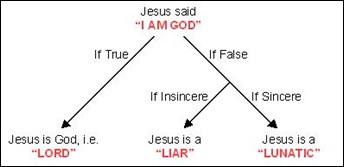 Then comes the real shock. Among these Jews there suddenly turns up a man who goes about talking as if He was God. He claims to forgive sins. He says He has always existed. He says He is coming to judge the world at the end of time. Now let us get this clear. Among Pantheists, like the Indians, anyone might say that he was a part of God, or one with God: there would he nothing very odd about it. But this man, since He was a Jew, could not mean that kind of God. God, in their language, meant the Being outside the world, who had made it and was infinitely different from anything else. And when you have grasped that. you will see that what this man said was, quite simply, the most shocking thing that has ever been uttered by human lips.
Then comes the real shock. Among these Jews there suddenly turns up a man who goes about talking as if He was God. He claims to forgive sins. He says He has always existed. He says He is coming to judge the world at the end of time. Now let us get this clear. Among Pantheists, like the Indians, anyone might say that he was a part of God, or one with God: there would he nothing very odd about it. But this man, since He was a Jew, could not mean that kind of God. God, in their language, meant the Being outside the world, who had made it and was infinitely different from anything else. And when you have grasped that. you will see that what this man said was, quite simply, the most shocking thing that has ever been uttered by human lips.
One part of the claim tends to slip past us unnoticed because we have heard it so often that we no longer see what it amounts to. I mean the claim to forgive sins: any sins. Now unless the speaker is God, this is really so preposterous as to be comic. We can all understand how a man forgives offences against himself. You tread on my toes and I forgive you, you steal my money and I forgive you. But what should we make of a man, himself unrobbed and untrodden on, who announced that he forgave you for treading on other men’s toes and stealing other men’s money? Asinine fatuity is the kindest description we should give of his conduct. Yet this is what Jesus did. He told people that their sins were forgiven, and never waited to consult all the other people whom their sins had undoubtedly injured. He unhesitatingly behaved as if He was the party chiefly concerned, the person chiefly offended in all offences. This makes sense only if He really was the God whose laws are broken and whose love is wounded in every sin. In the mouth of any speaker who is not God, these words would imply what I can only regard as a silliness and conceit unrivalled by any other character in history. Yet (and this is the strange, significant thing) even His enemies, when they read the Gospels, do not usually get the impression of silliness and conceit. Still less do unprejudiced readers. Christ says that He is ‘humble and meek’ and we believe Him; not noticing that, if He were merely a man, humility and meekness are the very last characteristics we could attribute to some of His sayings.
Asinine fatuity is the kindest description we should give of his conduct. Yet this is what Jesus did. He told people that their sins were forgiven, and never waited to consult all the other people whom their sins had undoubtedly injured. He unhesitatingly behaved as if He was the party chiefly concerned, the person chiefly offended in all offences. This makes sense only if He really was the God whose laws are broken and whose love is wounded in every sin. In the mouth of any speaker who is not God, these words would imply what I can only regard as a silliness and conceit unrivalled by any other character in history. Yet (and this is the strange, significant thing) even His enemies, when they read the Gospels, do not usually get the impression of silliness and conceit. Still less do unprejudiced readers. Christ says that He is ‘humble and meek’ and we believe Him; not noticing that, if He were merely a man, humility and meekness are the very last characteristics we could attribute to some of His sayings.
I am trying here to prevent anyone saying the really foolish thing that people often say about Him: ‘I’m ready to accept Jesus as a great moral teacher, but I don’t accept His claim to be God.’ That is the one thing we must not say. A man who was merely a man and said the sort of things Jesus said would not be a great moral teacher. He would either be a lunatic—on a level with the man who says he is a poached egg—or else he would be the Devil of Hell. You must make your choice. Either this man was, and is, the Son of God: or else a madman or something worse. You can shut Him up for a fool, you can spit at Him and kill Him as a demon; or you can fall at His feet and call Him Lord and God. But let us not come with any patronising nonsense about His being a great human teacher. He has not left that open to us. He did not intend to.
and is, the Son of God: or else a madman or something worse. You can shut Him up for a fool, you can spit at Him and kill Him as a demon; or you can fall at His feet and call Him Lord and God. But let us not come with any patronising nonsense about His being a great human teacher. He has not left that open to us. He did not intend to.
C.S. Lewis, Mere Christianity (1952; Harper Collins: 2001) 51-52.
Here it is... a classic C.S. Lewis argument! And I'm posting it in November which means there must surely be enough Lewis power quotes to get through a whole year. What a journey it's been so far.
ReplyDeleteWe have much to gain from reading more Lewis. I still remain in awe at the clarity of the argument presenting in today's reading. Explanations about what Lewis did there are far more complicated than the work itself!
The problem being addressed -- that someone might opt for a lesser yet logically impossible view of Jesus -- is still rampant today. How can we learn from Lewis and respond better to the "Oprah" version of Jesus so common now?
Keep 'em coming, Ken! Lots of folks are reading... I don't usually chime in because, frankly, everything Lewis says seems dead-on to me. There is rarely a reason to argue with the man...
ReplyDeleteGosh, do ever know what you mean about the "Oprah" version of Jesus... Sigh...
How do you square the claim of being "humble and meek" with the claim to being a God? Seems like a contradiction. Or is that a sacred mystery?
ReplyDeleteAnonymous, I think that's Lewis's point: You DON'T square those two claims... unless you really are God. And yes, that is the sacred mystery. (Or sacred paradox, if you prefer.)
ReplyDeleteJesus reveals God the Father to us, and we are often amazed by the mercy and love and compassion he shows. We might have expected something else from the One who reveals God to us, but could it be that God is humble and meek? Does God force himself upon us? Doesn't he speak with a still, small voice? How long will God be patient with us?
ReplyDeleteIt seems possible to me that Jesus in being humble and meek was showing us something about God.
Very inspirational man Lewis.
ReplyDeleteEveryone always tries to speak as if they truely understand the concept of Lord, Liar or Lunatic.
ReplyDeleteHere is someone that lived it recently.
http://lordliarorlunatic.wordpress.com
woooooord!
ReplyDeleteJesus' claims to deity are foundational to our faith, but they are hardly the only evidence of his true nature. As the Son of Man (his favorite term for himself), his life was both human and supernatural. His very birth was such, as were the miracles he performed as signs of his true nature. Who else but God in human form could quiet a raging storm, feed the multitudes with mere loaves and a few fish, raise the dead, and himself survive Roman execution to walk around in a resurrected body for thousands to see? If Jesus hadn't done these things and hadn't claimed to be God incarnate, nothing would have been written about him. No Gospel, no secular histories in the first century, and so on. In one sense, the very fact that he is still being discussed in the 21st. century is evidence of his divinity. Name one other human being from the first century that continues to have books written, movies made, articles, radio shows, etc. solely about his life. Jesus is who he says he is.
ReplyDeleteI'm surprised this argument has lasted so long. Probably because it's dumbed down and people like alliteration. If the "I am God" statement is false, there is obviously another alternative. Maybe no one's thought of it because it doesn't start with "L". What if he's simply wrong, mistaken, incorrect? What if he believed he was the son of God because, I don't know, his parents told him so? His parents, who happened to be in a sticky predicament with Mary pregnant out of wedlock? Perhaps it was them who were the lunatics, and Jesus merely a victim?
ReplyDeleteAs I understand it, Tom, Lewis is not presenting this as an argument that Jesus is God. He explains, "I am trying here to prevent anyone saying the really foolish thing that people often say about Him: ‘I’m ready to accept Jesus as a great moral teacher, but I don’t accept His claim to be God.’ That is the one thing we must not say." So Lewis's argument is that these two ideas about Jesus are incompatible.
ReplyDeleteLewis is saying that for Jesus to be wrong about being the son of God he'd have to be a liar or a mad man, which is obviously not the case. There's another option, one that isn't addressed in this argument, making this a false dilemma. I would say that if Jesus was misguided about his holy origins, he could very well still be a great moral teacher, so even your proposed intent of his argument is invalid. I would argue though that his desire is most certainly to prove that Jesus is God, and many people use this argument for exactly that purpose.
ReplyDeleteThere's also the Pantheist or Suitheist option: we are all God, & Jesus was one of those who gained experiential awareness of this fact. He was neither the sole Lord, Liar, nor Lunatic; he was Enlightened, or perhaps experienced a glimmer of Enlightenment & translated it into the concepts of the Jewish culture of his time, thus calling himself the Messiah.
ReplyDelete